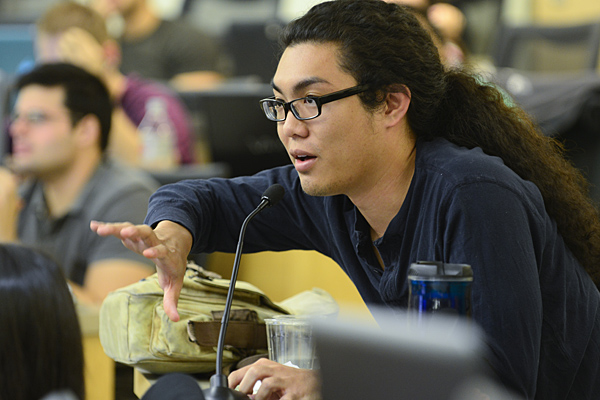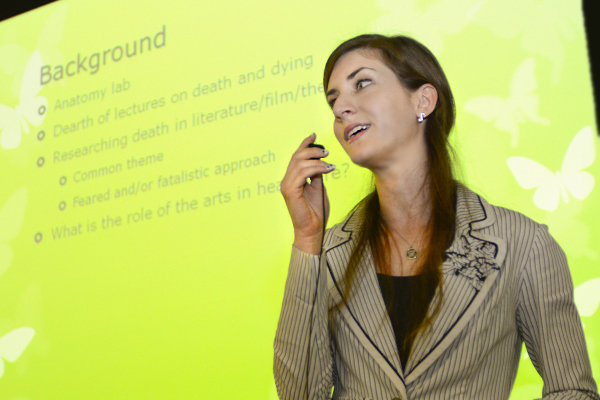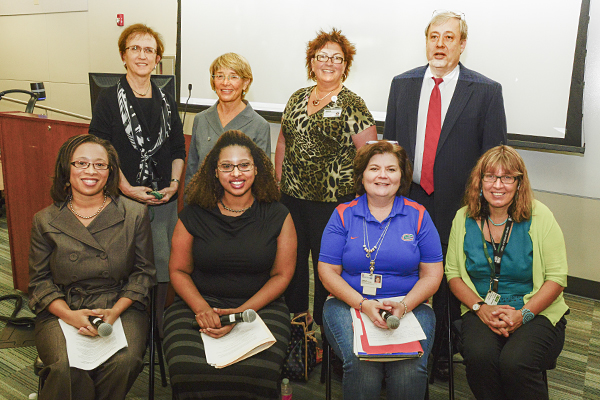Leading with a panel discussion of “The Immortal Life of Henrietta Lacks,” this year’s Scholarly Concentrations Program Student Symposium sparked some intriguing ethical questions about physician-patient relationships, informed consent of study participants, and balance of patient protections with innovation and the potential societal benefit of scientific research.
The 3rd annual symposium, sponsored Oct. 19 by the USF Health Morsani College of Medicine, featured 15 presentations by medical students participating in faculty-mentored scholarly concentrations of special interest such as health disparities, business and entrepreneurship in medicine, medical education and research.

Medical students who presented their projects at the 2012 Scholarly Concentrations Program symposium.
Before the presentations, students, faculty and staff engaged in discussion about the provocative issues raised by Rebecca Skloot’s book involving cancer, racism, ethics and poverty.
The woman at the heart of the non-fiction story, Henrietta Lacks, was a poor and mostly illiterate tobacco farmer, who was treated in the “colored” ward of Johns Hopkins Hospital in the 1950s for an aggressive form of cervical cancer. Decades after she died, her family learned that cells had been removed from Mrs. Lack’s cervix without her knowledge while she was a patient and cultured into the first human “immortal” cell line. These commonly used HeLa cells (named after the first two letters of Mrs. Lack’s first and last names) were commercialized and have profoundly benefitted scientists in many fields of research for decades. While those who marketed the cells profitted immensely, the Lacks family received no compensation.
Desiree Rivers, PhD, MSPH, a director of the Health Disparities Scholarly Concentration, prompted students to think about what the Henrietta Lacks story has to share about the need for better patient-physician relationships, especially among diverse, vulnerable patient populations. Establishing a relationship with patients encompasses such actions as using understandable language, communicating in a culturally-sensitive, respectful way, and practicing a team approach to care. When physicians and other healthcare practitioners take the time to do this, Rivers said, patients are more likely make informed decisions that may lead to better health outcomes.

Dr. Desiree Rivers, a director of the Health Disparities Scholarly Concentration.
Janelle Perkins, PharmD, of the USF Institutional Review Board, spoke about today’s IRB process to help ensure the ethical treatment of people participating in clinical research. She asked students to think about how circumstances might have unfolded differently if Henrietta Lacks had been asked for consent before her cells were harvested.
Megan Monroe, JD, a co-director of the Law and Medicine Scholarly Concentration, provided an overview of law pertaining to the property rights of human cells. Short summary of a complex topic: When the cells are in your body, they’re yours. But, once removed, the issue of ownership is not so clear.
William Marshall, Jr., MD, MBA, director of the Innovation, Entrepreneurship and Business in Medicine Scholarly Concentration, spoke about HeLa cells from a patent perspective – where business, research and healthcare often overlap. He led a discussion of whether the U.S. patent system would encourage innovation or stifle competition if HeLa cells were procured through informed consent today.
Lois LaCivita Nixon, PhD, MPH, director of the Medical Humanities Scholarly Concentration, chatted with students about the patient story and its importance in informed decision making. The role of the story is to take medical and scientific language and translate it through the arts or humanities into something the public will understand, Dr. Nixon said.

A symposium participant responds to a question posed to the audience during the panel discussion.
Following the panel discussion, student presented their projects with topics encompassing the challenges and needs of patients, neurosciences, innovations in cancer treatment, and challenges and opportunities for medical students.
First up was third-year medical student Danielle Kurant, whose medical humanities project entails writing a musical composition titled “From Diagnosis to Death” from a patient’s perspective. As an undergraduate student, Kurant studied music composition at Middlesex University in London as well as at USF.
Through music Kurant wants to share the common story of a patient faced with a life-altering diagnosis and explore how physicians influence the patient’s experience, for better or worse, in coming to terms with the terminal illness. She plans to complete the piece – written for a six-piece ensemble of violins, cello, flute, oboe and bassoon — in time for next year’s Scholarly Concentrations Symposium.

Student Danielle Kurant presents her medical humanities project “From Diagnosis to Death: A Patient Perspective,” which draws on her background in musical composition.
“The arts can serve as a bridge between the medical community and the public, and help empower patients to participate in their own care,” Kurant said.

Faculty and staff who participated in the panel discussion and helped organize this year’s Scholarly Concentrations Student Symposium
– Photos by Eric Younghans, USF Health Communications
